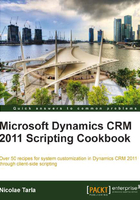
上QQ阅读APP看书,第一时间看更新
Conventions
In this book, you will find a number of styles of text that distinguish between different kinds of information. Here are some examples of these styles, and an explanation of their meaning.
Code words in text, database table names, folder names, filenames, file extensions, pathnames, dummy URLs, user input, and Twitter handles are shown as follows: "Generate a new JScript resource in your solution, named new_JSUserInput."
A block of code is set as follows:
function checkEmail(emailField)
{
var email=/^([a-zA-Z0-9_.-])+@([a-zA-Z0-9_.-])+\.([a-zA-Z])+([a-zA-Z])+/;
if(email.test(emailField))
{
// alert("true");
return true;
}
}
New terms and important words are shown in bold. Words that you see on the screen, in menus or dialog boxes for example, appear in the text like this: " Add the Contact entity to your solution if not already added."